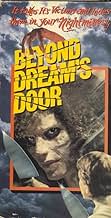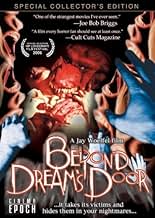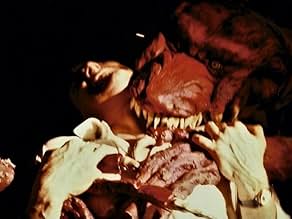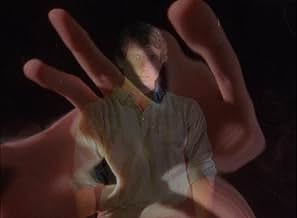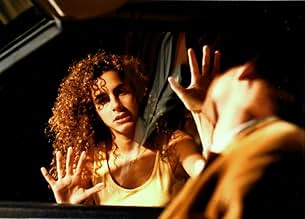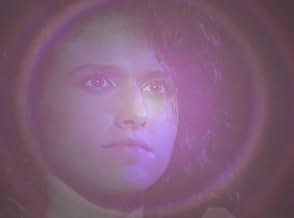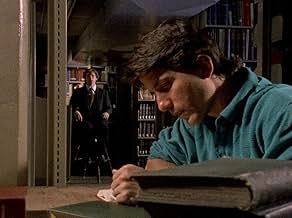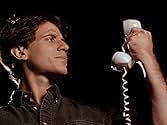Ben hasn't been able to dream since the deaths of his parents, but as he attempts to make human connections, his nightmares begin to spill over into all of their waking lives.Ben hasn't been able to dream since the deaths of his parents, but as he attempts to make human connections, his nightmares begin to spill over into all of their waking lives.Ben hasn't been able to dream since the deaths of his parents, but as he attempts to make human connections, his nightmares begin to spill over into all of their waking lives.
Marjorie Whitney
- Mrs. Oxel
- (as Marge Whitney)
Raymond Michael Bell
- Dead Dreamer
- (as R. Michael Bell)
- Director
- Writer
- All cast & crew
- Production, box office & more at IMDbPro
Featured reviews
A dark, complicated horror flick with the "cultability" of Phantasm! Jay Woelful's best effort and casting the absolutely beautiful Darby Vasbinder as the Dream Babe is perfect! She's a dream come true. Done on a shoestring budget, this movie is still able to conjur up enough imagination to give you night mares, or dreams of Darby Vasbinder!
It's easy to see that this movie was made on a shoestring budget. The special effects are not great, but the story itself is very interesting. The acting can be a little flat at times but that gives this film an odd sort of charm. The music and photography are good and that helps the movie quite a bit. The poetry and visual images give the movie a surrealistic feel that makes it feel otherworldly. I can't say it's a masterpiece, the scenes are a little choppy and it really could have used a bigger budget, but it does manage to overcome these issues and lift itself out of the Z grade and more into a B grade movie.
It's by no means perfect, but I have seen far worse and with bigger budgets. It is one of the better low-budget 80s films out there.
It's by no means perfect, but I have seen far worse and with bigger budgets. It is one of the better low-budget 80s films out there.
I love seeing low-budget and NO-budget films rise above their limitations to succeed in becoming something more than merely watchable. "BEYOND DREAM'S DOOR" is such a film, presenting an intelligent and engaging story with resourcefulness and creativity. Sure, some of the effects are on the hokey side(but wonderfully gross), and the acting is expectedly amateurish...big deal. Don't let forgivable flaws hold you back from enjoying this wild, surreal tale of a young man being haunted...and hunted...by his childhood nightmares, both in sleep and awake. He's neither the first, nor the last to endure this torment...he's simply "next".
Seven out of ten stars...a shining example of just how far enthusiastic, imaginative filmmakers can stretch a thin dime.
Seven out of ten stars...a shining example of just how far enthusiastic, imaginative filmmakers can stretch a thin dime.
Made in Ohio for very little money, BEYOND DREAM'S DOOR is a sometimes goofy, somewhat shabby, eerily entertaining film from the 1980's. All logic is tossed out in favor of nightmare imagery and an apocalyptic atmosphere.
This is a small project with a big, black heart. So, don't expect multi-million dollar special effects or A-list actors. Instead, expect a decent movie with just as many brilliant moments as cheeezey ones.
If you enjoy demons, ghouls, and / or the supernatural, then you'll probably like this. Especially gorehounds!...
This is a small project with a big, black heart. So, don't expect multi-million dollar special effects or A-list actors. Instead, expect a decent movie with just as many brilliant moments as cheeezey ones.
If you enjoy demons, ghouls, and / or the supernatural, then you'll probably like this. Especially gorehounds!...
Beyond Dreams Door was essentially the most important film in my young movie-watching life, and for good reason, as it represents everything a film should be - dynamic, experimental and most importantly, intelligent. It also yielded the notion, at least to me, that low-budget independent cinema was where the true passionate visionaries existed, people like Jay Woelfel.
Utilizing elements from popular culture and new wave French cinema and working with a limited budget and a mostly in experienced cast and crew, Jay Woelfel managed to craft a stylish cerebral film that dares to takes chances like few films before it were willing to do.
Bypassing the conventional formula exercised in most other horror films, Woelfel chooses to operate in a non-linear format (remember, this pre-dated Pulp Fiction and Reservoir Dogs by a few years) while also utilizing Hitchcock's various laws of systematization, specifically the use of colors, and the lighting schemes of the various characters. Add to this various other subtle factors that fail to stand-out during the initial viewings, but become quite prominent the more the film is examined, and, in the end, what you are left with is an important film, that is essentially way way ahead of its time.
The movie concerns a shy Ohio Psychology student Benjamin Dobbs, played by Nick Baldasare, who finds himself plagued by a series of horrific inter-connecting nightmares, after he unknowingly agrees to be apart of a dream research experiment. Ben's initial sense that the dreams might have something to do with the untimely loss of his parents quickly fades as they become increasingly stranger and more terrifying. Unable to cope, Ben seeks help in the form of the various on-campus teachers. His psychology professor Dr. Noxx, played Norm Singer, is his first obvious choice, and Noxx easily embraces Ben's pleas for help as something real. After looking into it, the two come upon a notation in a book, and a case history of another man named D.F. White, that seems to point definitively to the existence of the very things Ben has been dreaming about. Ben quickly discovers the 'things' in the dream realm aren't happy with the sudden Earthbound knowledge of their reality, and quickly take it upon themselves to get the evidence back any way they can. Woelfel makes a point to not render any religious allusions, and the doorway, and what lies beyond, remains vague enough for the viewers to decide for themselves what 'the beyond' actually is.
As the film unfolds, we also note that the narrative changes hands, along with the usage of colorful composition, as Ben passes on knowledge of his curse to the various people he asks for help. The second person to get swallowed up in Ben's nightmares is a teaching assistant Eric Baxter, played by Rick Kesler, who early on is posed a question by Noxx about what he would do if confronted with a life or death question -- and through the course of the film, is allowed to truly answer it. Baxter's initial reasons for helping Ben, and his later insistence that "It's not my problem" point to a screenplay not constructed to fit a formula, rather, the real actions of a three dimensional character. Also aiding Ben on his quest for answers is D.F. White (Daniel White) who died nearly twenty years earlier, and appears to him in the form of a ghostly apparition, or guardian angel, as one friend in college put it. The enigmatic White offers up cryptic words of advice, while leading Ben through the land of the dead and into the proverbial "light".
Visually the film is stunning, and the usage of color as a means of depicting the various character's motivations, is amazing. Personally, it was the first time I had ever seen it used before in film. Woelfel's insistence on telling the story in a non-linear format means a lot of jumping around, back-tracking, and various other things that will make for fun multiple viewings. Woelfel also avoids spoon-feeding his audience. Rather than pointing out the obvious, he allows the viewer to make up their own mind about what they are seeing. In my opinion, the film is much more effective because of this fact. The musical score, also composed by Jay Woelfel, is very good as it helps to add some genuine atmosphere to the film.
A few people have complained that the acting was stiff, but I felt it fit perfectly with the tone of the film, which is easily one of the more somber pieces one is likely to see. The special effects were lacking for the most part, but that doesn't take anything away from the piece as it becomes abundantly clear that this film is not about the boogeyman-in-the-closet but rather the psychology behind the boogeyman-in-the-closet.
Beyond Dreams Door is a cult film that has earned its status. It garnered much discussion and many long debates from my various friends in college, each with a differing theory one what, or who, Benjamin Dobbs is, and what actually lied beyond 'The Beyond'. I personally believe that Beyond Dreams Door should be mandatory viewing by anyone with a true interest in film. I highly recommend it.
Low-budget film-making at its absolute best!
Utilizing elements from popular culture and new wave French cinema and working with a limited budget and a mostly in experienced cast and crew, Jay Woelfel managed to craft a stylish cerebral film that dares to takes chances like few films before it were willing to do.
Bypassing the conventional formula exercised in most other horror films, Woelfel chooses to operate in a non-linear format (remember, this pre-dated Pulp Fiction and Reservoir Dogs by a few years) while also utilizing Hitchcock's various laws of systematization, specifically the use of colors, and the lighting schemes of the various characters. Add to this various other subtle factors that fail to stand-out during the initial viewings, but become quite prominent the more the film is examined, and, in the end, what you are left with is an important film, that is essentially way way ahead of its time.
The movie concerns a shy Ohio Psychology student Benjamin Dobbs, played by Nick Baldasare, who finds himself plagued by a series of horrific inter-connecting nightmares, after he unknowingly agrees to be apart of a dream research experiment. Ben's initial sense that the dreams might have something to do with the untimely loss of his parents quickly fades as they become increasingly stranger and more terrifying. Unable to cope, Ben seeks help in the form of the various on-campus teachers. His psychology professor Dr. Noxx, played Norm Singer, is his first obvious choice, and Noxx easily embraces Ben's pleas for help as something real. After looking into it, the two come upon a notation in a book, and a case history of another man named D.F. White, that seems to point definitively to the existence of the very things Ben has been dreaming about. Ben quickly discovers the 'things' in the dream realm aren't happy with the sudden Earthbound knowledge of their reality, and quickly take it upon themselves to get the evidence back any way they can. Woelfel makes a point to not render any religious allusions, and the doorway, and what lies beyond, remains vague enough for the viewers to decide for themselves what 'the beyond' actually is.
As the film unfolds, we also note that the narrative changes hands, along with the usage of colorful composition, as Ben passes on knowledge of his curse to the various people he asks for help. The second person to get swallowed up in Ben's nightmares is a teaching assistant Eric Baxter, played by Rick Kesler, who early on is posed a question by Noxx about what he would do if confronted with a life or death question -- and through the course of the film, is allowed to truly answer it. Baxter's initial reasons for helping Ben, and his later insistence that "It's not my problem" point to a screenplay not constructed to fit a formula, rather, the real actions of a three dimensional character. Also aiding Ben on his quest for answers is D.F. White (Daniel White) who died nearly twenty years earlier, and appears to him in the form of a ghostly apparition, or guardian angel, as one friend in college put it. The enigmatic White offers up cryptic words of advice, while leading Ben through the land of the dead and into the proverbial "light".
Visually the film is stunning, and the usage of color as a means of depicting the various character's motivations, is amazing. Personally, it was the first time I had ever seen it used before in film. Woelfel's insistence on telling the story in a non-linear format means a lot of jumping around, back-tracking, and various other things that will make for fun multiple viewings. Woelfel also avoids spoon-feeding his audience. Rather than pointing out the obvious, he allows the viewer to make up their own mind about what they are seeing. In my opinion, the film is much more effective because of this fact. The musical score, also composed by Jay Woelfel, is very good as it helps to add some genuine atmosphere to the film.
A few people have complained that the acting was stiff, but I felt it fit perfectly with the tone of the film, which is easily one of the more somber pieces one is likely to see. The special effects were lacking for the most part, but that doesn't take anything away from the piece as it becomes abundantly clear that this film is not about the boogeyman-in-the-closet but rather the psychology behind the boogeyman-in-the-closet.
Beyond Dreams Door is a cult film that has earned its status. It garnered much discussion and many long debates from my various friends in college, each with a differing theory one what, or who, Benjamin Dobbs is, and what actually lied beyond 'The Beyond'. I personally believe that Beyond Dreams Door should be mandatory viewing by anyone with a true interest in film. I highly recommend it.
Low-budget film-making at its absolute best!
Did you know
- TriviaThe producers had formerly been students at Ohio State University. In an effort to save funds and get the movie made, they talked the professor into letting his current students crew the film as part of a class project, which also provided them with access to locations on the campus. Post-production was done elsewhere to ensure the school couldn't attempt to claim ownership of the film.
- GoofsA moment before Eric throws Ben out of the house, a boom mic dips into the frame.
- Crazy creditsBeyond Dream's Door is a work of fiction and bears no similarities to real characters or events in your world at any point in the past, future or anywhere in between.
- Alternate versionsWhen the film was released on DVD in 2006 it was a director's cut with a new 5.1 sound mix. This version runs shorter than the original VHS release. The VHS version includes a scene with Julie in a phone booth, seemingly frustrated not being able to get a call through and hanging up the phone. The director's cut restores the original scene, in which she had a conversation with Eric. Later in the VHS version, Eric had a lengthy dream sequence that was removed from the director's cut. This was actually the unrelated short film Come to Me Softly (1988), which had been inserted into the movie to pad the running time at the behest of the distributor. The short was included as DVD and Blu-Ray extra, plus the director uploaded it to his YouTube channel.
- ConnectionsEdited from Come to Me Softly (1988)
- How long is Beyond Dream's Door?Powered by Alexa
Details
- Release date
- Country of origin
- Official sites
- Language
- Also known as
- За дверью сна
- Filming locations
- Production company
- See more company credits at IMDbPro
Box office
- Budget
- $40,000 (estimated)
Contribute to this page
Suggest an edit or add missing content



